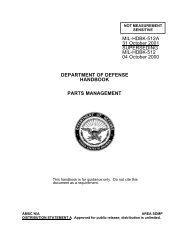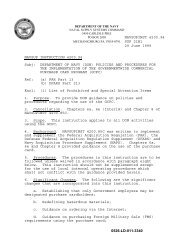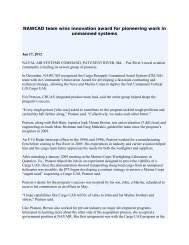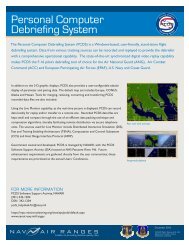department of defense handbook guidance for acquisition ... - NAVAIR
department of defense handbook guidance for acquisition ... - NAVAIR
department of defense handbook guidance for acquisition ... - NAVAIR
Create successful ePaper yourself
Turn your PDF publications into a flip-book with our unique Google optimized e-Paper software.
MIL-HDBK-29612-1Athe Government users will upgrade either their hardware or s<strong>of</strong>tware or both. The Governmentand the contractor should agree up-front as to what technology upgrades the Government canexpect the contractor to incorporate after the CITIS has been implemented. The Governmentmay also want to state explicitly that CITIS shall be upgraded to be compatible with any majorchanges in hardware and/or network configuration. CITIS user group meetings can serve as anexcellent <strong>for</strong>um <strong>for</strong> discussion <strong>of</strong> compatibility problems, technology advancements, and theadvantages and disadvantages to upgrades to the CITIS.D.10 CITIS ISSUESD.10.1 Legal issues. When CITIS is being considered and/or developed, the programmanager must be aware <strong>of</strong> some <strong>of</strong> the legal issues accompanying the use <strong>of</strong> a CITIS. Therelationship between CITIS and the future SDD and Defense Shared Data Warehouse (DSDW)initiatives should also be considered when determining the scope and functionality <strong>of</strong> the CITIS,to reduce the number <strong>of</strong> possible conflicts when these systems are finally implemented. BecauseCITIS can involve extensive sharing <strong>of</strong> data between contractors, subcontractors, andGovernment activities, a significant number <strong>of</strong> legal issues have been raised and are still beingdebated. Some <strong>of</strong> the most prevalent issues include the questions <strong>of</strong> proprietary data rights (whoowns the data at what time), s<strong>of</strong>tware licensing, warranties and liabilities, and international dataexchange.D.10.1.1 Proprietary data rights. The extent and nature <strong>of</strong> rights which the Governmentmay acquire to use, copy, or disclose data items shall be as expressly stated in the contract. Referto DFARS <strong>for</strong> details concerning proprietary data rights. When dealing with intellectualproperty, there is an increased risk <strong>of</strong> misuse <strong>of</strong> proprietary and business sensitive data in digital<strong>for</strong>m. No DoD regulation currently exists to assess liability on third parties <strong>for</strong> copyright orpatent infringement. Even with access limitations, proprietary markings, such as proprietarylegends and restrictive distribution statements, may be inadvertently deleted. The problem couldbe compounded if the CITIS network includes access by other contractors and subcontractors inaddition to the prime contractor, because the release <strong>of</strong> proprietary data to widely accesseddatabases could amount to abandonment <strong>of</strong> secrecy with a resultant loss <strong>of</strong> rights. Finally, thereis the potential problem where Contractor A doesn’t want Contractor B to have access to its data,but it can be difficult to prevent that access on a robust CITIS network. All <strong>of</strong> these issuesshould be considered and discussed by the Government and the prime contractor in the earlystages <strong>of</strong> CITIS planning.D.10.1.2 S<strong>of</strong>tware rights/licensing. Potential third party licensing problems can arisewhenever CITIS is used to launch/access other applications. If the applications being accessedare commercial s<strong>of</strong>tware packages, the contractor will need to investigate the licensing policies<strong>of</strong> the s<strong>of</strong>tware development company. In some cases, they may need to either purchaseindividual licenses <strong>for</strong> the maximum number <strong>of</strong> concurrent CITIS users or purchase a network or106

















